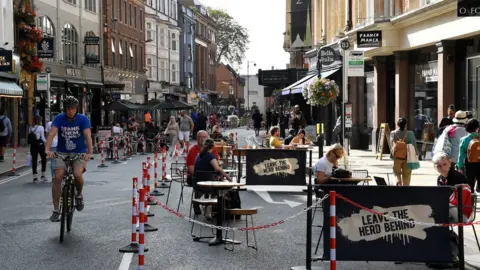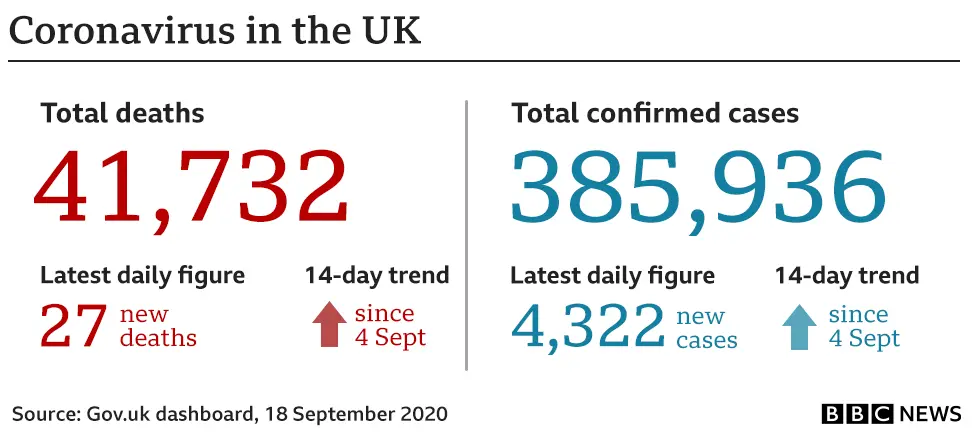Covid-19: Tighter national rules considered for England by government
 Reuters
ReutersPubs and restaurants could be shut for a few weeks as part of stricter measures across England to slow the surge of coronavirus cases.
The government is considering a short period of tighter rules which could be announced in the next week, BBC political editor Laura Kuenssberg said.
Schools and most workplaces would be kept open during those weeks.
Health Secretary Matt Hancock told the BBC the government is "prepared to do what it takes" against Covid-19.
It comes as the UK recorded a further 4,322 confirmed cases of coronavirus - the first time the daily total of positive tests has exceeded 4,000 since 8 May.
Another 27 deaths were reported within 28 days of a positive test.
Described by the government as a "circuit-break", the measures being considered could involve re-introducing restrictions in public spaces for a period of a few weeks. Schools and workplaces would stay open.
Ideas suggested by the government's Scientific Advisory Group for Emergencies (Sage) include closing some parts of the hospitality sector.
No 10 is also considering limiting the opening hours of pubs and restaurants across the country, as has already happened in some areas.
Mr Hancock said there had been an "acceleration" in cases in the last couple of weeks, with the number of people admitted to hospital doubling about every eight days.
He stressed it was "critical" that people followed social distancing guidelines and local lockdown rules, where they applied, to "avoid having to take serious further measures".
The Office for National Statistics' weekly infections survey for England and Wales, used by the government to base its decisions, estimates there were about 6,000 new cases a day in England in the week to 10 September.
'Circuit-break'
Scottish First Minister Nicola Sturgeon has said the next few days will be "critical" to avoid another full-scale lockdown in Scotland.
Ms Sturgeon, Welsh First Minister, Mark Drakeford, and Labour leader Sir Keir Starmer have all asked Boris Johnson for an emergency Cobra meeting to be called.
At a meeting on Wednesday night, the UK government's chief scientific adviser and medical adviser said they were forecasting a significant number of deaths by the end of October if there were no further interventions.


Basic maths shows us how quickly coronavirus cases can, theoretically, soar.
Around 4,000 infections a day, doubling every eight days, would be 128,000 new daily cases by the end of October.
That is not guaranteed to happen, and a change in our behaviour, the "rule of six" or restrictions like those in north-east England could improve the situation.
The point of a national "circuit-break" would be to achieve a controlled drop in the levels of coronavirus without needing a full lockdown.
This does two things, obviously it helps avoid having very high levels of the virus that could overwhelm hospitals.
But it also gives us more options. Any contact tracing programme or system of local lockdowns is far easier to implement when levels of the virus are low. The higher the number of cases, the fewer targeted measures the government has to use.
The problem is once the circuit-break is over, cases would begin to rise again and it may take multiple circuit breaks to get us through winter.

Meanwhile, new rules have been announced for north-west England, the Midlands and West Yorkshire, to come into force from Tuesday, in an effort to control the spread of the virus.
Similar restrictions have already come into force in north-east England, affecting almost two million people, banning them from meeting people from other households and requiring restaurants and pubs to shut at 22:00 BST.


But it is understood the government turned down down a request from the local council in Leeds to bring in early closing for bars and pubs there.
Other parts of the UK under local lockdown conditions include - including Birmingham, Greater Manchester, Caerphilly, and the Belfast council area.
The four nations of the UK are in charge of their own lockdown restrictions, with Scotland, Wales and Northern Ireland implementing slightly different rules to England.
The health secretary said the government's current approach was "targeted interventions" and stressed "a national lockdown was the last line of defence".


"The strategy is to keep the virus down as much as is possible whilst protecting education and the economy," Mr Hancock added.
"And throw everything at the science which eventually is the way we're going to spring out of this."
Prime Minister Boris Johnson is understood to be deeply reluctant to order another national lockdown, where everyone would be asked to stay at home and businesses to close.

- SOCIAL DISTANCING: What are the rules now?
- LOOK-UP TOOL: How many cases in your area?
- YOUR QUESTIONS: Our answers on the "rule of six"
- LOCAL LOCKDOWNS: What happens if you have one?

Earlier this week he described the potential impact of this on the economy as "disastrous". Chancellor Rishi Sunak is also understood to have warned ministers of the potential damage to the economy.
The government is also concerned about the impact of more restrictions on daily life on those who need treatment for non-Covid related illnesses.
In other key developments:
- A rapid test can accurately diagnose a coronavirus infection within 90 minutes without needing a specialist laboratory, scientists say
- Personal protective equipment will be free for care homes until next March, as part of a government coronavirus plan for NHS England this winter
- The R number, which measures how quickly the virus is spreading, has risen to between 1.1 and 1.4 from between 1.0 and 1.2 last week, the government said. It means on average 10 infected people will infect between 11 and 14 people, so the epidemic is growing
- British retail sales have continued to increase for the fourth consecutive month, boosted by spending on household goods and DIY, according to official figures
- London's New Year's Eve firework display will not be taking place this year, Mayor of London Sadiq Khan told LBC
- Northern Ireland's health minister has described three Van Morrison songs protesting against coronavirus lockdowns as "dangerous"

- YOUR NEW OBSESSION IS COMING: Little Mix: The Search sees the multi-award winning group creating bands
- HOW CAN I RELAX?: Soothe your soul with Mindful Escapes



Have you been affected by the issues raised in this article? Do you have any questions? Share your experiences by emailing [email protected].
Please include a contact number if you are willing to speak to a BBC journalist. You can also get in touch in the following ways:
- WhatsApp: +44 7756 165803
- Tweet: @BBC_HaveYourSay
- Please read our terms & conditions and privacy policy
If you are reading this page and can't see the form you will need to visit the mobile version of the BBC website to submit your question or comment or you can email us at [email protected]. Please include your name, age and location with any submission.
